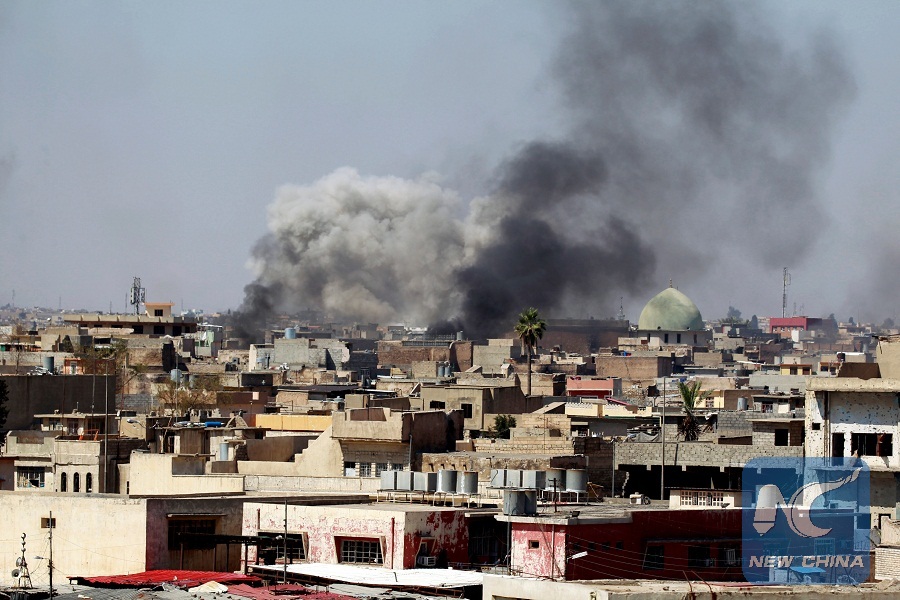
Smoke rises over the city during clashes between Iraqi forces and Islamic State militants, in Mosul, Iraq March 25, 2017. (Xinhua/Reuters Photo)
BAGHDAD, March 25 (Xinhua) -- Iraqi forces will mainly pursue street-to-street battles to dislodge Islamic State (IS) militants from the heavily-populated western Mosul rather than by heavy shelling and airstrikes in order to minimize civilian casualties, state-run al-Sabah newspaper reported Saturday.
The military decision came "to refute the lies claimed by the terrorist gangs of Daesh (IS militant group) after it portrayed the innocents whom they killed as victims of the bombing of the heroic Iraqi forces in order to mislead public opinion," al-Sabah quoted sources from the Iraqi military command as saying.
The remaining IS-held neighborhoods in western Mosul will be liberated mainly by fighters highly trained on fighting in populated neighborhoods to "protect the unarmed civilians, who are used by terrorists as human shields in order to slow down the advance of the security forces," the newspaper said.
Media reports said hundreds of civilians were buried under the debris of their houses by heavy bombardments of U.S.-led coalition and Iraqi aircraft during the past few days.
Mohammed Abd-Rabbah, a member of parliament from Mosul, told Xinhua that many families would shelter in a basement at a big house in the neighborhood of Mosul al-Jadida, or New Mosul in English, but the house and its surroundings were bombed by warplanes, killing some 137 civilians, most of them women and children.
After recapturing the neighborhood, civil defense teams pulled out some 200 bodies of civilians after clearing the demolished houses in only two streets in the densely-populated Mosul al-Jadida, according to the lawmaker.
Abd-Rabbah also said IS militants prevent civilians from leaving their homes, using them as human shields and their houses to fight security forces.
Late on Friday night, the United Nations expressed concerns about reports of civilian casualties in Mosul, and urged the parties of the conflict to avoid such casualties.
"We are stunned by this terrible loss of life and wish to express our deepest condolences to the many families who have reportedly been impacted by this tragedy," a UN statement quoted Lise Grande, the humanitarian coordinator for Iraq, as saying.
"Nothing in this conflict is more important than protecting civilians. All parties of the conflict are obliged to do everything possible to protect civilians. This means that combatants cannot use people as human shields and cannot imperil lives through indiscriminate use of fire power," Grande said.
Meanwhile, Bruno Geddo, the representative of the UN Refugee Agency in Iraq, warned that an estimated 400,000 Iraqi civilians are trapped in Mosul's old city in northern Iraq as fighting intensifies and people continue to flee.
"The worst is yet to come," he said. Speaking by phone with the UN News Center, Geddo said the fighting in the west of the city has been more intense than the less densely populated east, where the battle ended in January.
"People are stuck between a rock and a hard place," he said. "There's fighting shelling, bombing."
"When people try to flee, extremists shoot them. Some have tried to leave during prayers or under cover of fog at first light, but were killed," Geddo added.
On Tuesday, Jasim al-Attiyah, deputy minister of the Iraqi Migration and Displaced Ministry, told Xinhua that the fierce battles brought the total number of civilians who left their homes in Mosul's both eastern and western sides to 415,000 since the beginning of the military offensive in October to reclaim the IS's largest stronghold in Iraq.
Iraqi Prime Minister Haider al-Abadi, who is also commander-in-chief of the armed forces, announced the start of an offensive on February 19 to drive extremist militants out of the western side of Mosul.
Late in January, Abadi declared the liberation of Mosul's eastern side, or the left bank of Tigris, after over 100 days of fighting IS militants.
However, Mosul's heavily-populated western part with its narrow streets appears to be a bigger challenge to Iraqi forces.
Mosul, 400 km north of the Iraqi capital of Baghdad, has been under IS control since June 2014, when government forces abandoned their posts and fled, enabling IS militants to take control of parts of Iraq's northern and western regions.

